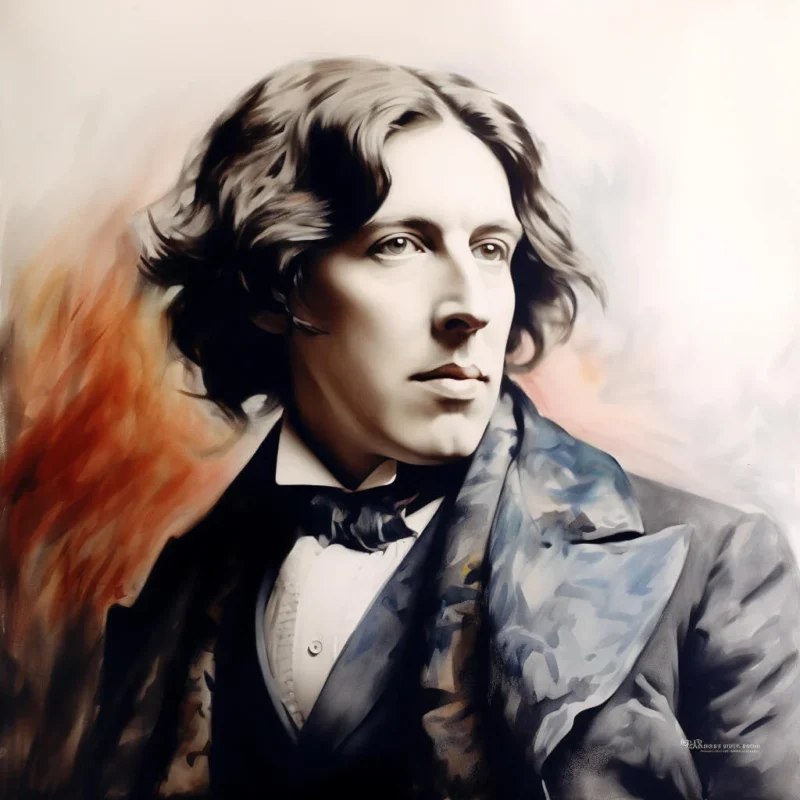In the autumnal embrace of Dublin, Ireland, Oscar Wilde graced the world with his presence on a luminous October day in 1854. Born into the illustrious lineage of William and Jane Wilde, whose intellect and artistry were as renowned as they were revered, Wilde was destined for greatness from the moment he drew his first breath.
His formative years were a tapestry woven with threads of literary enchantment and intellectual fervor. Schooled at the venerable halls of Trinity College, Dublin, and later at the venerable bastion of learning, Oxford University, Wilde’s intellect sparkled like a gem amidst the scholarly firmament.
London, with its bustling streets and vibrant cultural scene, beckoned Wilde with its siren call of artistic possibility. It was here that he unfurled his literary wings and soared to dazzling heights. His debut collection of poetry, “Poems,” was a symphony of lyrical brilliance and philosophical depth, laying the foundation for a career that would resonate through the corridors of time.
Yet, it was Wilde’s foray into the realm of prose that truly captivated the collective imagination. “The Picture of Dorian Gray,” with its incandescent exploration of beauty, morality, and the human psyche, marked a watershed moment in literary history, cementing Wilde’s status as a master storyteller par excellence.
But Wilde was more than just a wordsmith; he was a maestro of the stage, whose theatrical productions enraptured audiences with their wit, charm, and incisive social commentary. From the scintillating satire of “Lady Windermere’s Fan” to the biting wit of “The Importance of Being Earnest,” Wilde’s plays were a testament to his unrivaled talent and keen insight into the human condition.
Yet, amidst the glittering accolades and adulation, Wilde’s personal life was beset by turmoil and tragedy. His tempestuous relationship with Lord Alfred Douglas, a love that dared not speak its name, led to a public scandal and Wilde’s subsequent incarceration on charges of “gross indecency.”
Yet, even in the darkest depths of despair, Wilde’s indomitable spirit shone brightly. His time in prison yielded a literary masterpiece in the form of “The Ballad of Reading Gaol,” a haunting elegy to the human spirit and a poignant reflection on the nature of suffering and redemption.
Though Wilde’s flame was extinguished far too soon, his legacy endures as a beacon of artistic brilliance and unyielding courage. His words continue to resonate with readers across the globe, a testament to the enduring power of literature to transcend the constraints of time and space.
Real Name: Oscar Fingal O’Flahertie Wills Wilde
Date of Birth: October 16, 1854
Birth Place: Dublin, Ireland
Residence: Throughout his life, Wilde lived in various places, including Dublin, London, and Paris.
Profession: Writer, poet, and playwright.
Nationality: Irish
Religion: Wilde was born into an Irish Protestant family, but he converted to Catholicism later in life while in prison.
Partner: Wilde was married to Constance Lloyd in 1884, with whom he had two sons, Cyril and Vyvyan. However, he later became romantically involved with Lord Alfred Douglas, also known as “Bosie.”
Father: William Wilde, a renowned eye and ear surgeon, and philanthropist.
Mother: Jane Francesca Wilde (née Elgee), a poet and nationalist known by her pen name “Speranza.”
Horoscope: Libra
Age: Oscar Wilde passed away on November 30, 1900, at the age of 46.
